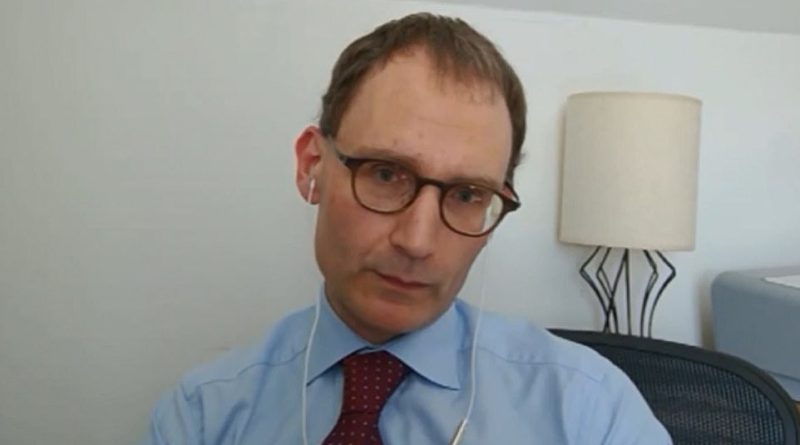Neil Ferguson says herd immunity could be achieved in the UK before end of the year
‘Professor Lockdown’ Neil Ferguson has said high infection rates and the UK’s mass vaccine rollout could see herd immunity against the coronavirus achieved before the end of the year – meaning a return to normal by autumn.
Ferguson, whose grim predictions of 500,000 deaths in the UK convinced the government to implement the first lockdown, now says he is ‘optimistic’ about the country’s future in 2021.
Speaking to The Sunday Times, Ferguson said that he believes there will soon be a slowdown in infection rates, and perhaps even a decline – driven by high infection rates giving people immunity without the need for a jab.
‘That may be slightly aided by the fact there is quite a lot of herd immunity in places like London,’ he said. ‘Maybe 25% or 30% of the population has now been infected in the first wave and second wave. So that adds to the reduction of transmission.’
He also predicted that the Northwest of England – another area where large numbers have been infected – could also be on its way to herd immunity.
A policy of herd immunity – allowing the virus to spread through the population so people develop an immunity to the virus – was initially touted by some senior government figures, including Prime Minister Boris Johnson.
But when the potential cost to human life of following such a police was revealed, with Ferguson saying as many as 500,000 people could die as a result, the government changed their approach.
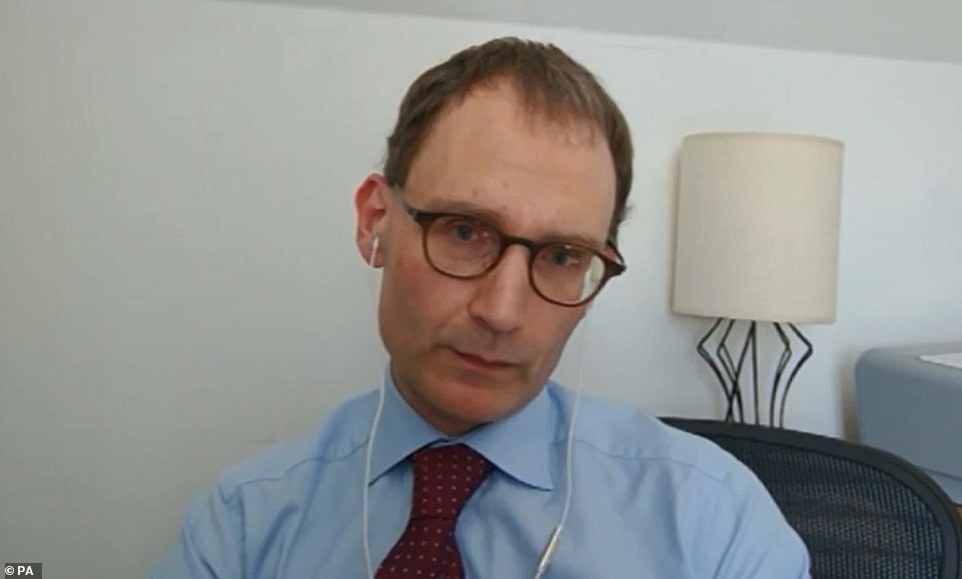
Ferguson, whose grim predictions of 500,000 deaths in the UK convinced the government to implement the first lockdown, now says he is ‘optimistic’ about the country’s future in 2021 as vaccines are rolled out
Like many scientists, Ferguson believes herd immunity against Covid-19 should be achieved through the administration of vaccines to the population, and not by allowing the virus to spread.
But due to the UK now being one of the worst-hit countries in the world in terms of number of cases, as well as now having three vaccines approved for use, herd immunity is edging closer, the professor believes.
Saturday saw a further 59,937 cases reported, taking the UK’s total number of cases reported to over 3 million.
The number of patients in hospital being treated for Covid-19 surpassed 32,000 for the first time, while a further 1,035 people succumbed to the virus – taking the total to 81,000.
But Ferguson says that things will only get worse in the months to come, saying it is ‘highly likely’ that the UK will hit 100,000 deaths. ‘Even optimistically it will be quite difficult to avoid another 20,000 deaths,’ he said.
In order for the UK to achieve herd immunity, a high percentage of the population will have to be vaccinated against Covid-19, although the exact number is currently unknown.
For herd immunity against measles, one of the world’s most contagious diseases, around 95 percent of the population need to be immune, while in the case of polio, the threshold is around 80 percent.
For measles, the final five percent are safeguarded by the fact that the diseases does not spread among people who have been vaccinated.
Most scientists and experts believe that at least 80 percent of the population will need to vaccinated in order to achieve herd immunity against Covid-19, but Ferguson admitted ‘We don’t know the extent to which immunity completely blocks infection — neither natural immunity nor immunity you would get from vaccines.’
The professor said that now, nine months into the pandemic, scientists have a clearer picture in terms of how long a person remains protected from the virus after being infected.
‘If you get infected once, then at least for a year or more you will have quite a lot of protection against disease, a bit like a vaccine,’ he said.
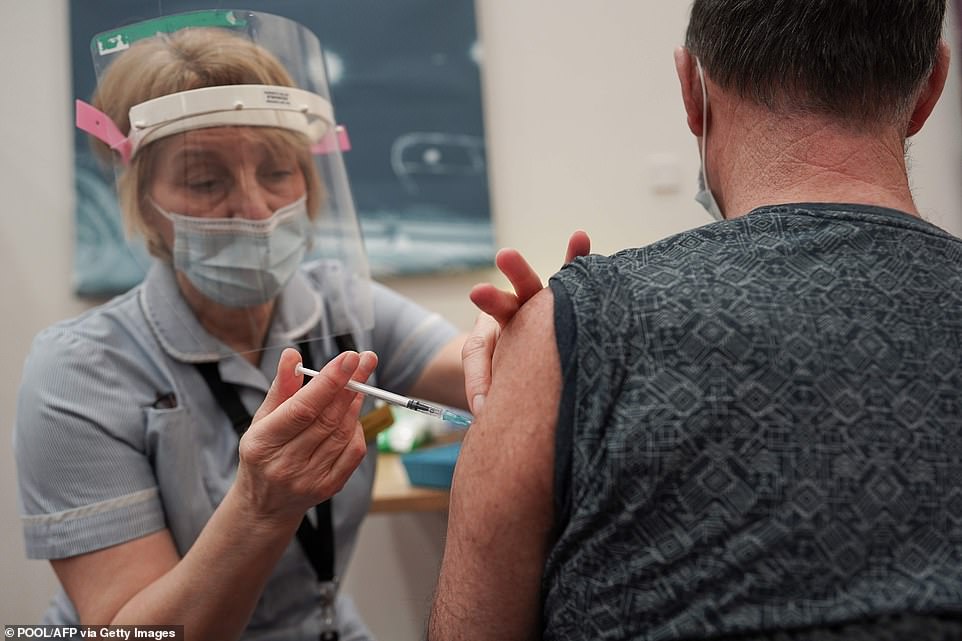
Key Worker James Hutchinson receives the Pfizer-BioNTech Covid-19 vaccine at the Life Science Centre at the International Centre for Life in Newcastle upon Tyne, northeast England, on January 9. In order for the UK to achieve herd immunity, a high percentage of the population will have to be vaccinated against Covid-19, although the exact number is currently unknown
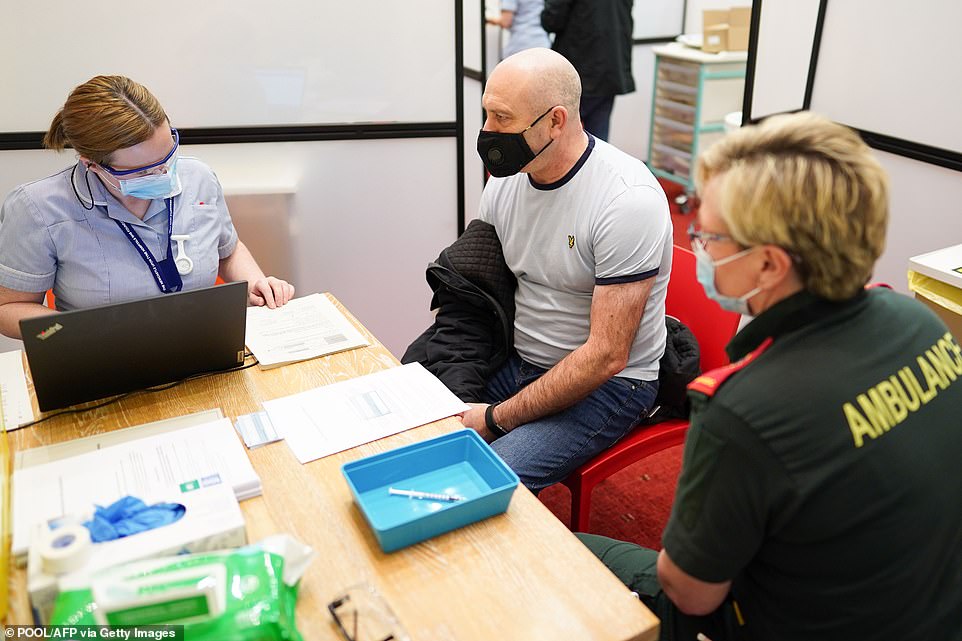
Key Worker Russell Robson from Sunderland is briefed before he receives the Pfizer-BioNTech Covid-19 vaccine at the Life Science Centre at the International Centre for Life in Newcastle upon Tyne, northeast England, on January 9
‘You’re not necessarily protected against being infected again, or transmitting. You’re just not very likely to get very sick. There are all of these caveats around immunity. It’s true of the vaccine as well as natural infection.’
Asked whether the latest lockdown will help the country get a grip on the virus, Ferguson said that it depends on how transmissible the new Covid-19 variant is.
During the first lockdown in March, the R rate – that refers to the number of people an infected person can pass the virus to – dropped to 0.6. The new variant, that could have an R rate 50 percent higher than older variants, suggests the lockdown could bring the rate down to 0.9 – below the target of 1.
However, Ferguson said experts are not certain the latest lockdown is as tough as the first, saying ‘it’s going to be quite a close-run thing,’ and that the decline could be slower than in March and April.
He added that had the current spike in cases been seen earlier in the year – before vaccines had begun to be rolled out – the picture would be much bleaker.
‘We will be able to vaccinate a large proportion of the population by Easter,’ he said. Even if we don’t quite make the prime minister’s timeline, it’s highly likely we’ll make those key groups by mid-March.’
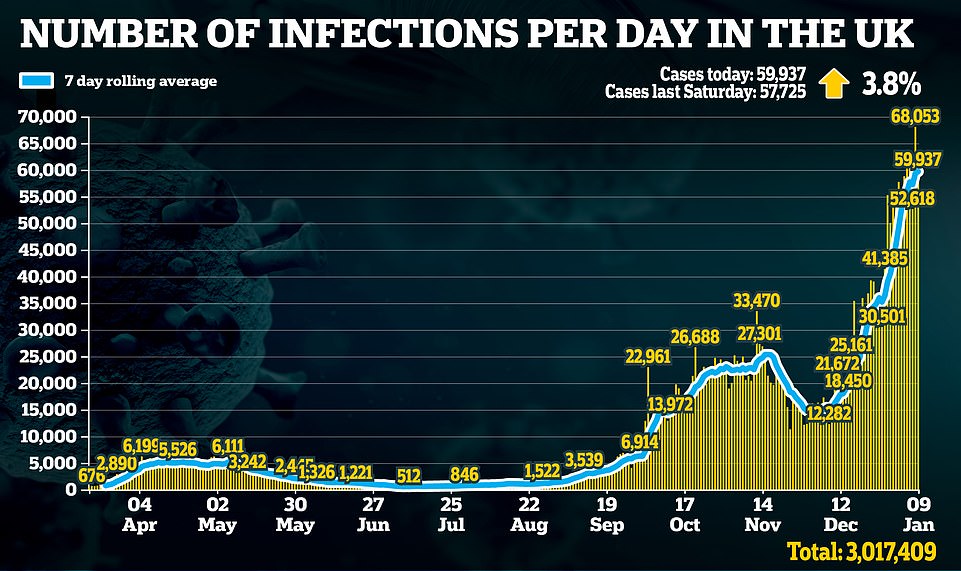
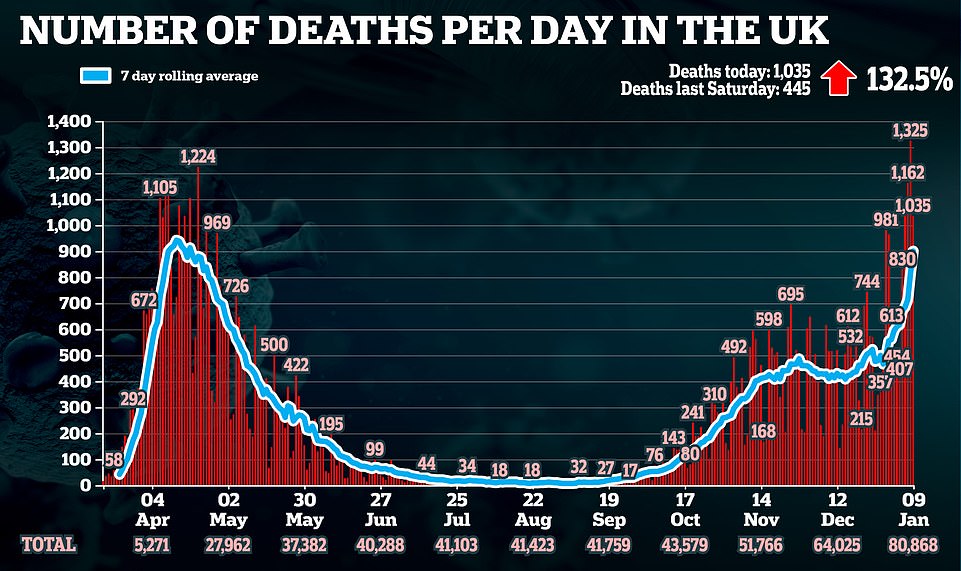
The Queen and Prince Philip received their Covid-19 vaccinations yesterday – and made the fact public to encourage take-up of the injections which could finally turn the tide against the deadly pandemic.
As Boris Johnson announced an ambitious ‘test and jabs’ blitz to combat the virus, Her Majesty, 94, and the Duke of Edinburgh, 99, received their injections at Windsor Castle from a doctor in the Royal Household.
It came as Britain recorded more than 1,000 Covid-19 deaths for the fourth day in a row as the new mutation wreaks havoc across the country.
A further 1,035 people have died today in the deadliest Saturday since April 18, as the total Covid death toll since the pandemic began hit a grim 80,000.
The total marked a 132.5 per cent rise on the 445 deaths recorded on Saturday last week and was the highest Saturday figure since April 18.
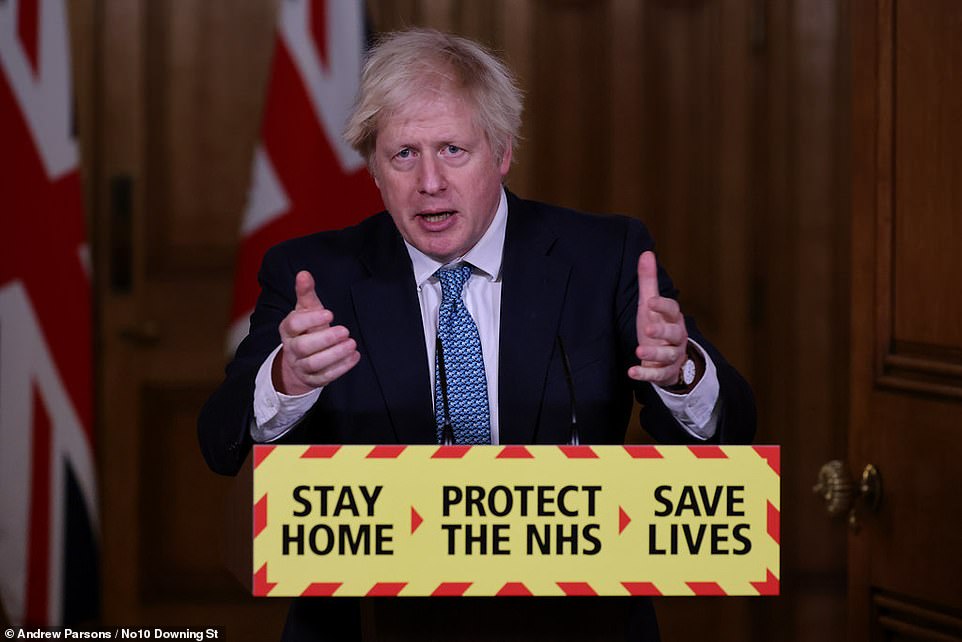
Prime Minister Boris Johnson has issued a plea to families and begged them to stay home to save lives as the UK recorded its highest death toll since the pandemic began today and the NHS launches a new ad campaign fronted by Chris Whitty
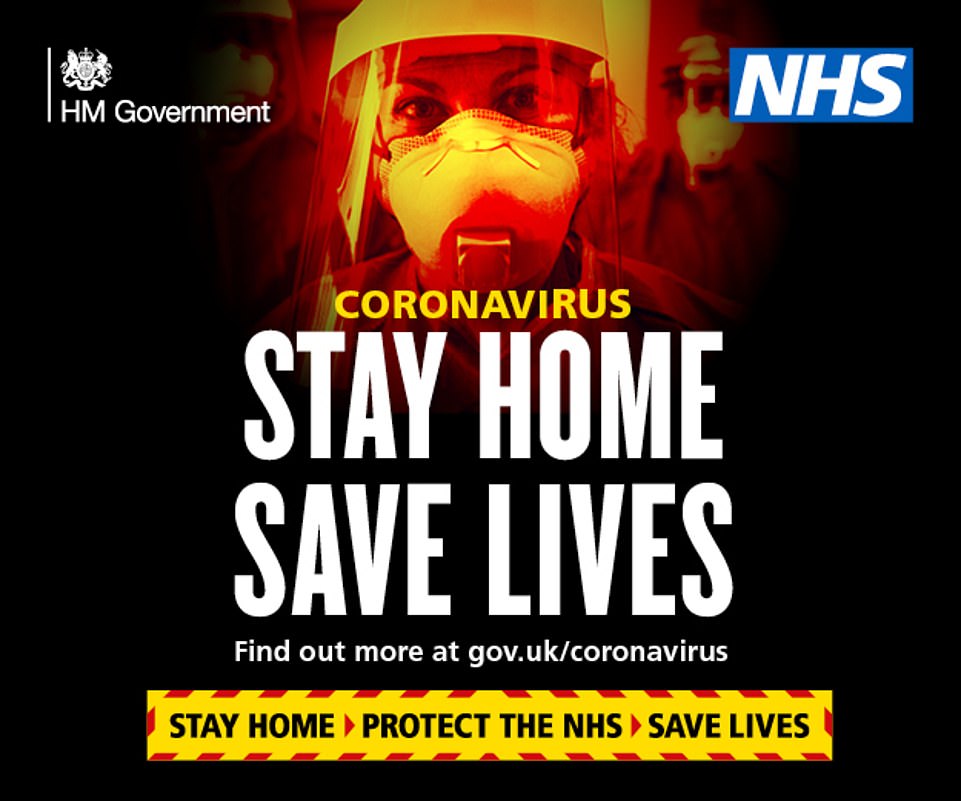
Everyone in England is being urged to stay at home and ‘act like you’ve got it’ as part of a major advertising campaign. including posters (pictured) encouraging the public to control the spread of the virus and protect the NHS and save lives
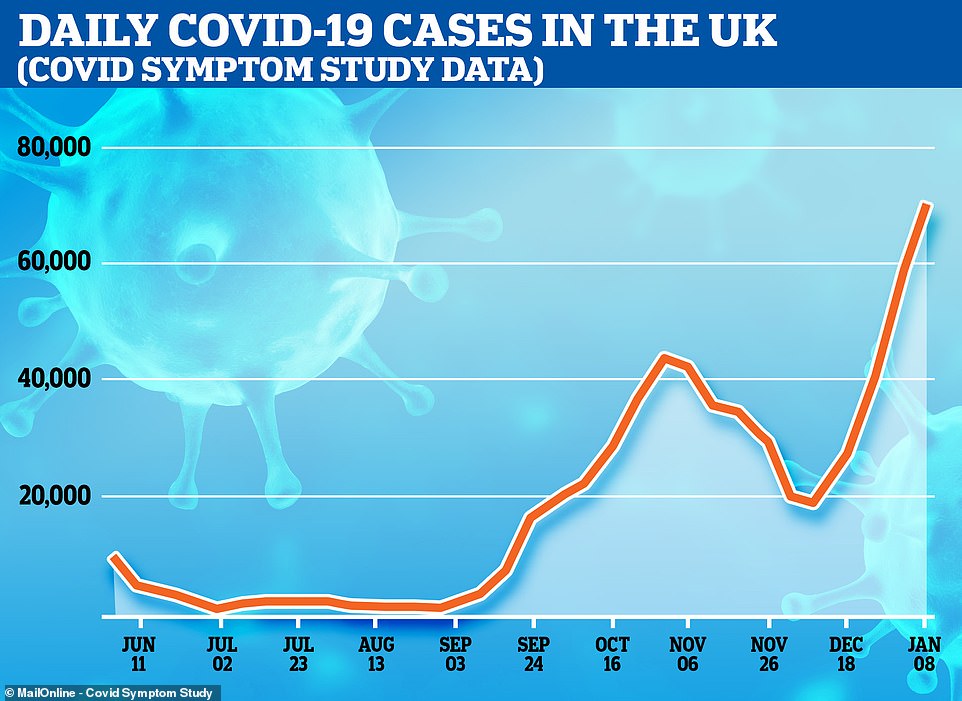
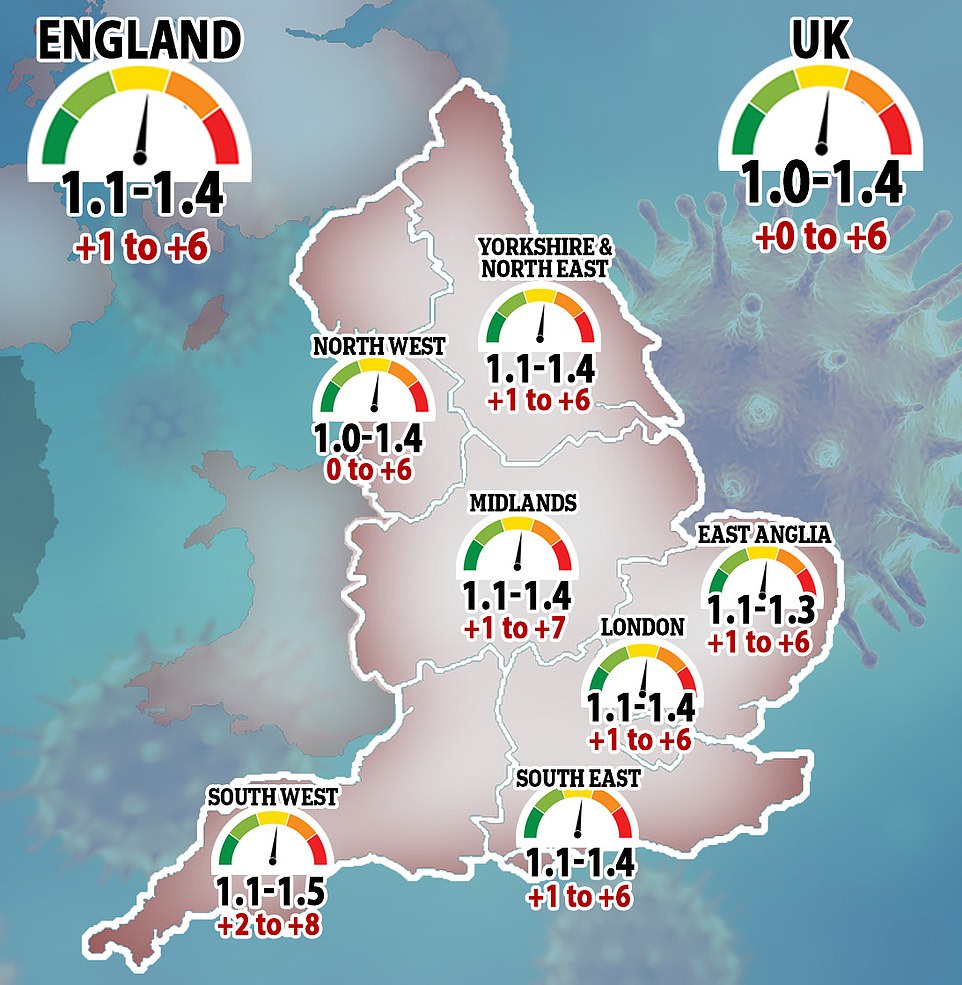
But in a positive sign the upward curve in cases may be levelling out a further 59,937 people tested positive, up just 3.8 per cent on last Saturday.
It is also more than 8,000 cases fewer than the 68,053 recorded yesterday – a record high. Friday also saw 1,325 more deaths.
Yet Professor Chris Whitty warned hospitals are facing ‘the worst crisis in living memory’, with 46,000 medical workers now off sick.
The Prime Minister said on Friday night that the drive aimed to have offered 12 million people the jab in England by the middle of February.
More than 1.5 million people have been vaccinated so far, but the rate needs to rise closer to two million a week for Mr Johnson to hit his target. He has pledged to bring in the Army to bolster the programme.
After the Queen and Prince Philip received their vaccine, Mr Hancock said he was ‘delighted’, tweeting: ‘We are defeating this vaccine jab by jab.’
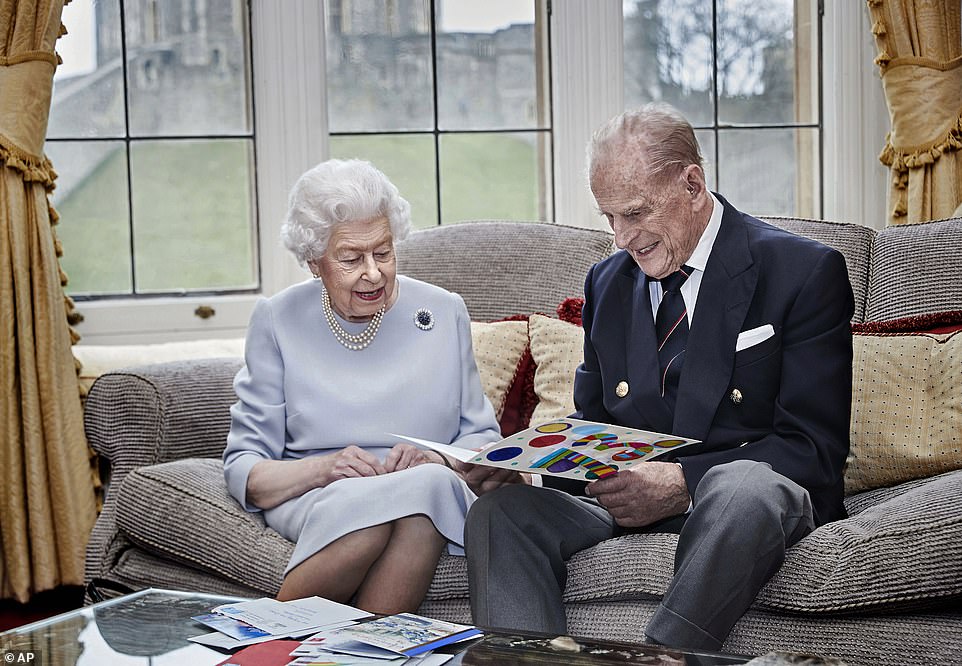
As Boris Johnson announced an ambitious ‘test and jabs’ blitz to combat the virus, Her Majesty, 94, and the Duke of Edinburgh (pictured in November), 99, received their injections at Windsor Castle from a doctor in the Royal Household
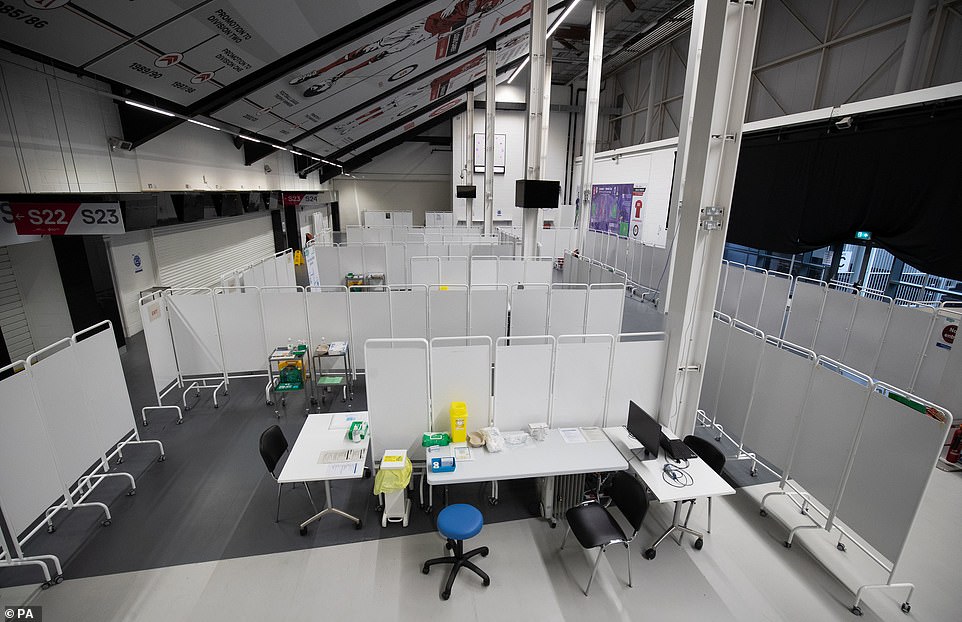
Vaccination booths are pictured inside Ashton Gate Stadium in Bristol, which is one of seven mass vaccination centres which will open on Monday
While the Royal couple wait for their second dose, the so-called HMS Bubble – the protective shield around them created by staff isolating and being regularly tested – will be maintained.
A senior SAGE official on Friday warned the actual number of Britons currently getting infected every day is closer to 150,000 – claiming that the size of the second wave is now significantly worse than the first.
As Britain’s death toll continues to climb, experts are calling for an even tougher lockdown to combat the rapidly-spreading new variant while the Government issued a new campaign blitz to scare people into obeying lockdown rules.
England is now in its toughest and longest shutdown since last spring and may not emerge from it until all the most vulnerable groups have been vaccinated against Covid-19.
Prof Whitty warned hospitals are facing ‘the worst crisis in living memory’ as Covid-19 cases continue to soar – with 46,000 medical workers now off sick.
Britons who don’t take the coronavirus lockdown seriously will cause ‘avoidable deaths’ when critically ill patients are turned away at the hospital door, Professor Chris Whitty warned in a scathing article for the Sunday Times.
And almost 50,000 hospital workers are currently off sick with Covid-19, according to the chair of the British Medical Association, Chaand Nagpaul, meaning an already stretched workforce is under even more pressure, reported The Guardian.
He said: ‘It is only if the NHS workforce is kept fit and well that we will be able to meet the unprecedented surge in demand that the coming weeks and months will bring as well as delivering the vaccine programme that remains our only hope to end this dreadful pandemic.’
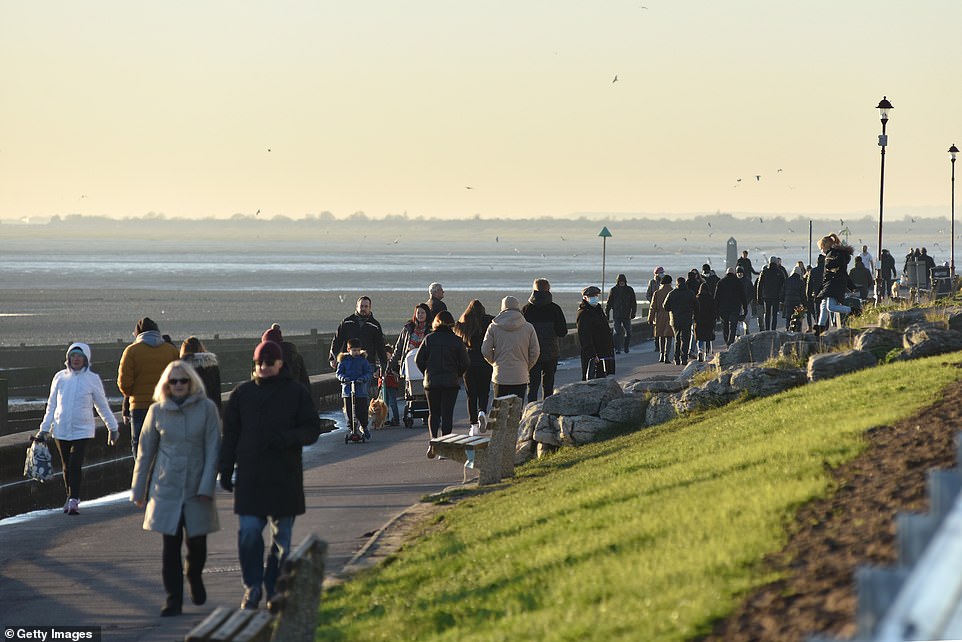
Crowds of people were seen walking along the seafront in Southend (pictured) on the deadliest Saturday since April 18
Prof Whitty blasted coronavirus rulebreakers for being the ‘link in a chain’ that will allow the deadly virus to infect a and kill the elderly and vulnerable.
‘We must stay home except for work, exercise and necessary activities. Every unneccesary interaction you have could be the link in the chain of transmission which has a vulnerable person at the end,’ he wrote.
The country has two weeks before hospitals are likely to be completely overwhelmed, Prof Whitty added, as the nation is plunged into the ‘most dangerous situation’ in living history.
Prof Whitty has also appeared in adverts urging Britons to ‘act like you’ve got’ coronavirus to ‘protect the NHS and save lives’.
Two terrifying new posters also show a patient dying in hospital and a healthcare worker wearing full PPE, warning Britons: ‘If you go out, you can spread it. People will die.’
This week’s enormous case figures – which have exceeded 50,000 every day since Monday – have added pressure on the PM to speed up the sluggish vaccination programme designed to start getting Britain out of lockdown by mid-February.
Scientists have warned the current lockdown measures are too ‘lax’ and cannot contain the new Covid variant, so are demanding stricter restrictions as ‘interactions are now riskier’ than in the first wave of the pandemic.
While 90 per cent of the population ‘overwhelmingly’ sticking to regulations, Britain’s streets and public transport have remained busy this week allowing the virus to spread, with one expert describing the new strain as a ‘pandemic within a pandemic’.
As a result, ministers are considering introducing tougher measures as part of the crackdown, including possibly making face masks mandatory in busy outdoor areas.
On Saturday, Professor Kevin Fenton, London regional director of Public Health England, said the more coronavirus patients the NHS has to deal with, the more difficult it is to keep other services open as he urged anyone doubting the seriousness of the situation to read and listen to the words of staff and patients.
He told BBC Breakfast: ‘I would encourage people to read, look at the programmes that you’re running on TV where you’re interviewing doctors, where you’re interviewing patients who’ve had this very severe disease and are suffering from the long-term effects of it.
‘This is the reality and that is the truth. So the advice would be listen, read, but stay at home. Protect yourself, protect your families.’
SAGE scientist Professor Susan Michie this morning warned that the current nation-wide lockdown is ‘too lax’.
She said the virus thrives in cold weather and people spending more time indoors increases the risk of transmission.
She said a wide scope for what counts as a key worker means classrooms are nearly half full and public transport is crowded at school pick up and drop off – on top of rush hour for key workers.
Permitted household contact for certain trades – including non-essential tradespeople or nannies – also increases the risk of the virus spreading rapidly, the professor said.
Professor Michie, professor of health psychology at University College London, told BBC Radio Four’s Today programme: ‘This is quite a lax lockdown because we’ve still got a lot of household contact, people go in and out of other people’s houses if they’re a cleaner, a non-essential trade person or a nanny.
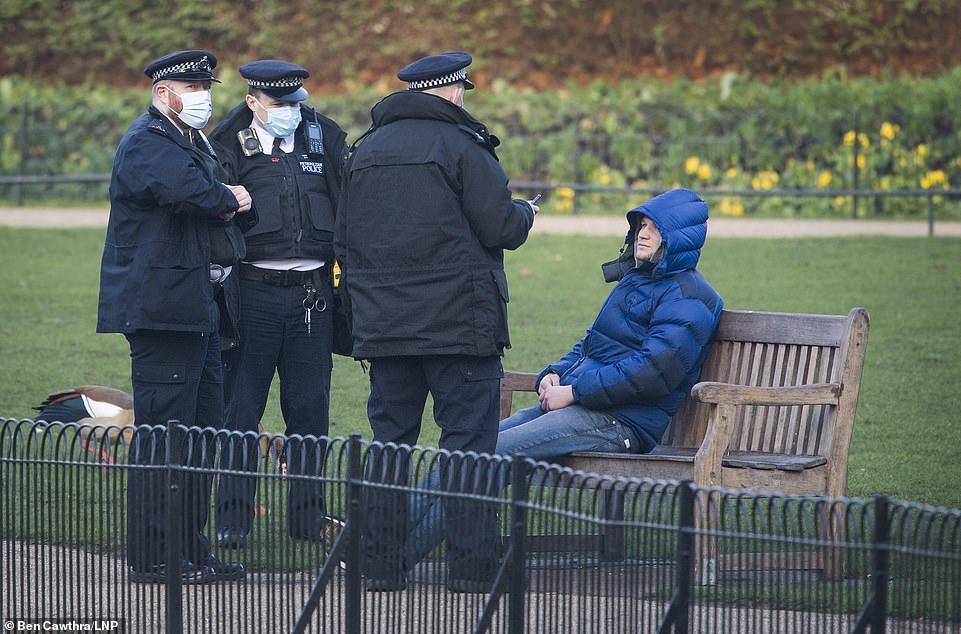
Three police officers wearing face masks question a man sitting on a bench in St James’s Park in central London this morning
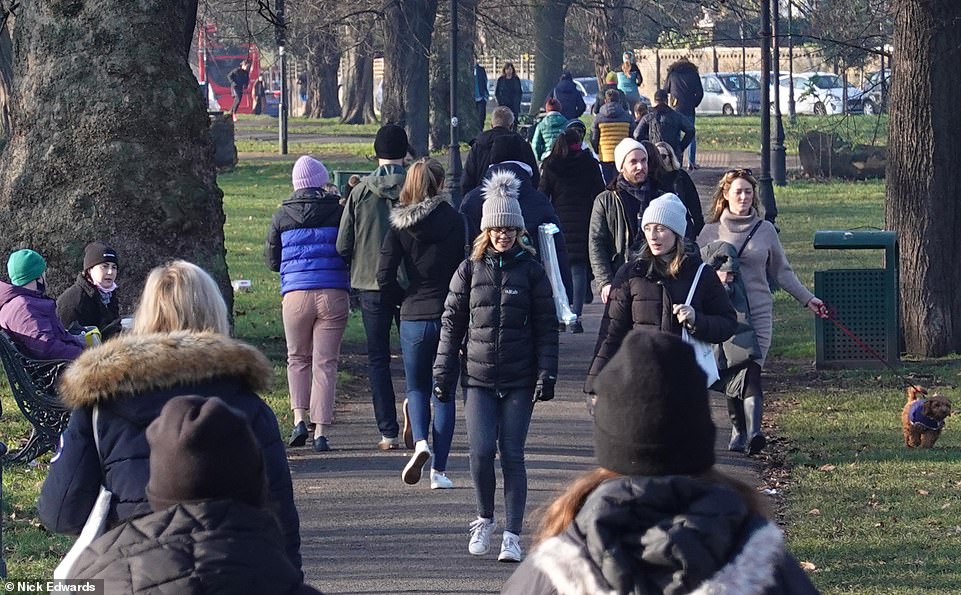
Despite around 90 per cent of the population ‘overwhelmingly’ sticking to regulations, the streets and public transport have remained busy this week, allowing the virus to spread. Pictured: Clapham today
‘We also have mass gatherings in terms of religious events and nurseries being open, and you have this wide definition of critical workers so we have 30 to 50 per cent of classes full up at the moment and very busy public transport going to and from these things.
‘It’s definitely too lax. If you compare ourselves with March we have the winter season and the virus survives for longer in the cold plus people spend more time indoors and we now know aerosol transmission which happens indoors is a very big source of transmission for this virus.
‘Secondly, we have this new variant which is 50 to 70 per cent more infectious. You put those two things together alongside the NHS being in crisis, we should have a stricter, rather than a less strict lockdown than we had in March.’
Professor Michie’s concerns were echoed by Dr Adam Kucharski, an epidemiologist at the London School of Hygiene and Tropical Medicine, who said the new variant should be treated as a ‘new pandemic within a pandemic’.
The Sage member told Radio 4’s Today Programme: ‘The early signals we’re seeing are suggesting that there is probably less movement in the population than there was in November but perhaps slightly more than there was in April, and obviously that’s concerning because, with this new variant, essentially each interaction we have has become riskier than it
was before.
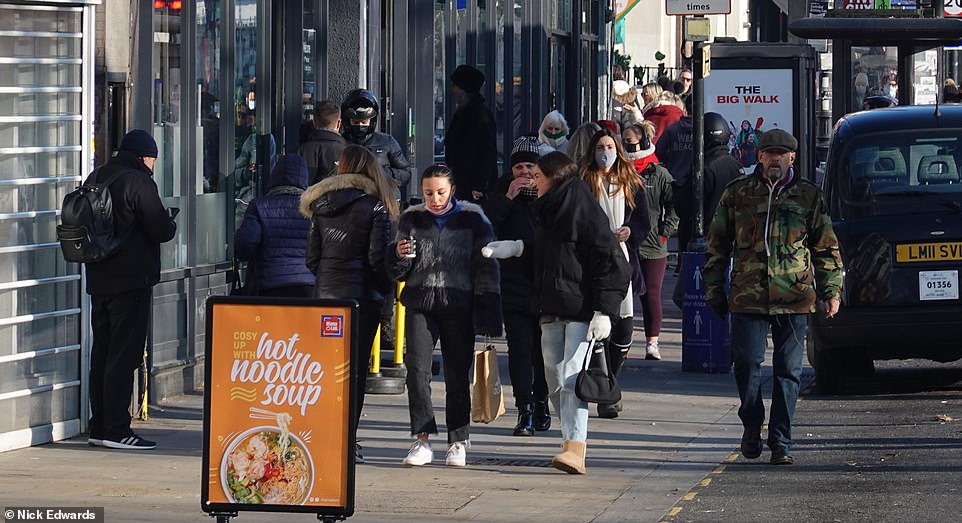
People out and about Clapham, South London today after a major incident has been declared by the London Mayor due to rapid rise in Covid-19 cases England in currently in its 3rd Lockdown due to Covid 19. restrictions mean people can not leave home apart for work, exercise, and shopping for essential items pubs and restaurants have closed, Shops selling non essential Items are also closed, people have been asked to work from home where possible and mixing with other households is not allowed
‘Even if we went back to that last spring level of reduction in contacts, we couldn’t be confident we would see the same effects as we saw last year because of the increased transmission.
‘To some extent we can think of this as a new pandemic within a pandemic.
‘From the data coming out, this is a very serious threat and new data from PHE (Public Health England) that came out yesterday suggested that that risk per contact is probably 40-50% higher than it was.
‘So both for the UK, and many other countries as well, we need to get away from this idea that we’re going to see a repeat of what happened last spring with our behaviours and really face the possibility that this is much riskier and we’re going to have to work much harder to reduce the impact.’
Police have vowed to get even tougher with lockdown fines, despite officers in Derbyshire being criticised for taking the crackdown too far they swooped on two friends for driving just seven miles to go for a walk at a beauty spot.
As a result, the ‘intimidating’ force is reviewing its Covid operations after getting clarification about the rules, with West Mercia Police also mocked for threatening to fine people £200 for playing in the snow.
Even so, the message from Government sources today is that police should be focusing more on enforcing rather than explaining rules, now nearly 10 months since the very first restrictions came into effect.
However, Proffesor Michie said to get people to comply, a more positive approach is needed to be taken rather than stricter enforcement.
‘What we know from this pandemic is what really motivates people is knowing there’s a really serious threat, knowing that what they do can make a difference and also knowing what they do can protect other people and their communities.
‘The behavioural committee of SAGE says consistently what we need is more support and enablement for people to adhere, not punishment. For example one area where there’s really poor adherence, and has been throughout, is having to isolate at home for what is now 10 days.
‘Our own data shows only 30 per cent of people with symptoms are staying at home. The reasons given are they may have caring responsibilities outside the house, they may need to get provisions, or importantly, they have to go out to work to get income.
‘What you need to be effective is have people who people trust and identify with. Yes, experts and scientists are trusted a lot more than politicians but we should also think about people from people’s own communities that are respected, particularly young men who find adherence most challenging, and think about who they identify with and respect, and that’s often sports personalities, singers, people from film and television.
‘We should be much more creative and imaginative about the kind of people who are speaking out.’

